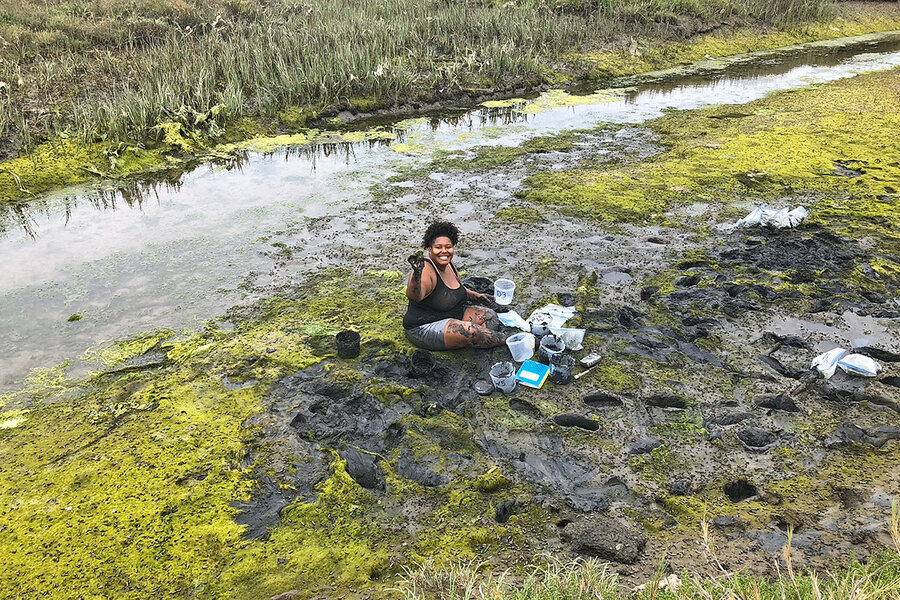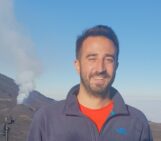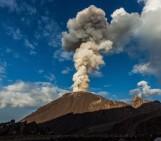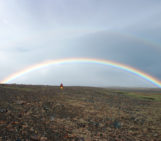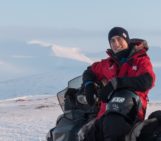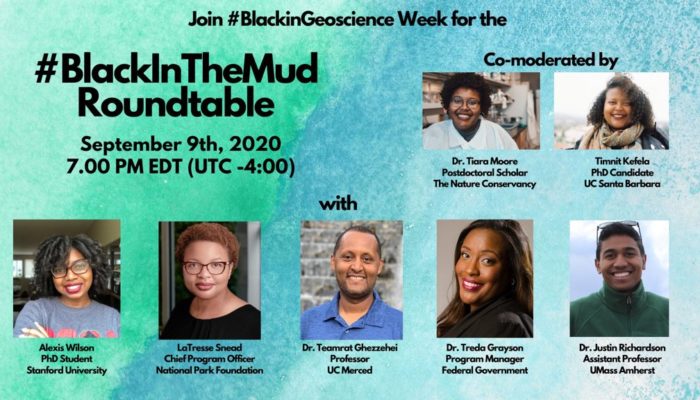
After telling a personal and traumatizing field experience to my fellow colleagues of color, I found that we all had shared similar events! Shocked and outraged, I wanted to find a place to expose and highlight these events thus the #BlackInTheMud panel was created.
This event was inspired by this picture. And it’s so funny because this photo has been used, until it’s almost like a stock photo on a lot of different websites on a lot of different event flyers, like, ‘Oh, look at this black girl in the mud, look at this person doing research.’ And it’s interesting, because no one ever really asked me, who took this picture? Because there’s no way I took it!? Right? And so that’s where the story starts with me just, getting a permit to actually work in the location where this photo was taken. And if you’re a field scientist, or scientist at all, you know, permitting takes time. So this was a very planned out situation for me. I went out of my way to get a permit, to make sure that my time out there was all right, you know, make sure I had all the certifications. And so, I’m out in the field. And a woman comes up to me, a white woman. And she says, immediately, ‘what are you doing out here? You’re not supposed to be out here. I can call the cops.’
And it’s just like, it’s such a jarring feeling. Because I saw on Twitter a lot of people, saying oh, well, you know, I’ve been hassled by outsiders a lot. But I think the difference is the cops mean different things to different people. And so for me, as a black woman, the cops being called now puts me in a life or death situation. But [this threat of the] cops being called, now no longer does it matter that I’m a scientist, I can’t be shy, it’s simply because I was there in that place. Someone thought I didn’t belong. And so of course, I’m trying to figure out how I’m going to navigate the situation. And so I tell her, ‘I’m a scientist, I have a permit to be here. Um, you know, I’m just doing this research. Don’t call the cops’.
And of course, she’s like, ‘Oh, my gosh, you’re a scientist. Wow. Tell me all about your project! How can I do anything to help you?’ And I’m like, ‘girl, what?’ My heart is beating fast! Like, I just saw my whole life flash. But now I have to entertain you? I have to talk with you now. And spend more time with you. And now I have to figure out a way for you to help me. So, me being who I am, well, I’m out here, ‘can you take this photo, my phone is up there.’
So she gets my phone. I smile for the camera. And so this hashtag really embodies this whole experience – because I had to really qualify why I was there. And then after she left, I had to continue my research. I had to continue my project after being shaken up, after having that traumatic experience. I had to sit out there because I was already there, I had driven to this field site, I had already gotten a permit. So I had to continue to do my work. So that’s what it is.
Maybe you’ve been hassled in the field, maybe somebody told you, you weren’t where you belong. But that experience as a black woman knowing that if the cops are called on me, that could be it. We could be saying my name. That’s the difference. And that’s what the purpose of this panel is today, for us to highlight the experiences being Black in the mud.
Read the full Black in the Mud Roundtable transcript here.
Timnit Kefela, PhD candidate, University of California, Santa Barbara.
I often wonder if anyone has really had that moment where they feel seen for the first time. Not in the way that marvels at you like a one-dimensional individual that serves as a spectacle for an unwelcoming space, but in the way that your humanity is actively acknowledged, empathized with and celebrated. Moderating this panel felt like I was being seen for the first time in a while. We as Black geoscientists seldom have the opportunity to just be scientists. Our identities are complex, especially in a world where our skin color is enough reason to denigrate our personhood. It was frustrating yet validating to know that my experience is not a lonely one, regardless of career stage in this field. The roundtable echoed the reality of being ignored, how we are seen yet unseen at the same time in our respective sectors, how research focused on our communities are often held to less of a standard than novelty. It emphasized how the solutions we focus on environmental problems are not focused on marginalized communities, partly because of those designing them. Communities like ours are not accounted for in the environmental future, be it from the research, policy and industry perspective. As for allies, major crucial takeaways emphasized by our panelists include recognizing that allyship is an active role. It is not the mere acknowledgment that marginalized groups deserve to be treated well but morphing how you think by providing continuous support and exercising empathy. Uplift us, celebrate us, advocate for us, listen to us and most importantly believe us.
Dr Justin Richardson, Assistant Professor, University of Massachusetts Amherst
The #BlackintheMud Panel was a great event, it amplified voices traditionally unheard in the geosciences and was a moment of solitude of our shared experiences and desire for things to change. Overall, the panelist had similar experiences of exclusion from the general geosciences, pressures from around us and within us to conform or change, and the added pressures of being black in America. Because we were all in different fields or stages of our careers, we can see how racism exists at all career levels, with slightly different manifestations. It can be from expectations or microaggressions from our peers as students, early-career members are not invited to the same functions or opportunities, and mid to late career members face insubordination or challenges to their authority. Worst of all, we feel that our work, especially those in our communities, are not appreciated as those working in remote, unique locations that are the part of the dying hallmark of being a geoscientist. There was plenty of hope too! We all recognized that we have sponsors, allies, and mentors that have helped us out in key aspects of our careers. We also recognize that geosciences are what we want to be doing and it is a rich and rewarding career and hope to inspire future generations to be #blackinthemud. Shout out to Dr. Tiara Moore and soon to be Dr. Timnit Kefela for putting it together to amplify our voices!
Alexis Wilson, PhD candidate, Standford University
I was honored to be invited to speak on the Black in the Mud panel. It is imperative that I share my thoughts and experiences on issues of diversity, equity, inclusion, and justice. By speaking out, I aim to shed light on the unique experiences and injustices Black scientists face in this field and call others to action in resolving these inequities. This panel gave me a chance to do so and it was a fantastic experience to be able to reflect and share my thoughts with colleagues who have experienced similar things and with a broader audience. Afterwards, many people shared via social media that they enjoyed the panel and learned a lot from us sharing our experiences, so to me it was very successful. I believe underrepresented groups in Geosciences (and other fields) should have more opportunities to speak our truth and receive support from our community.
Dr Tiara Moore, Postdoctoral Scholar, The Nature Conservancy.
What does it mean to be #BlackInTheMud? It means that no matter the amount of education, the certificates, the well articulated presentations, the code-switching, the palatability I am seen as if I do not belong, a threat, a problem, mud. It means that knowing this, I navigate a world that was never meant for me to survive and yet I thrive anyway. Being #BlackInTheMud is existing not because of the institution but in spite of the institution. It’s knowing that when I walk in the room I will have to qualify why I belong and when I walk in the field people will assume I’m doing something wrong. The #BlackInTheMud panel was the first opportunity for me to talk openly with a group of geoscientists about our struggles in front of the public and it was so inspiring to see. Of course it is unfortunate because we all have this shared pain, but it was uplifting to see so many survivors in one place. I look forward to dismantling the systemic racism that has caused such interesting journeys because my hope for the future is that #BlackInTheMud is used to highlight Black people playing in the mud vs Black people feeling like mud is constantly thrown in our faces. Now that more people are listening to our stories, I hope you truly hear and believe us, then take action to help us!

